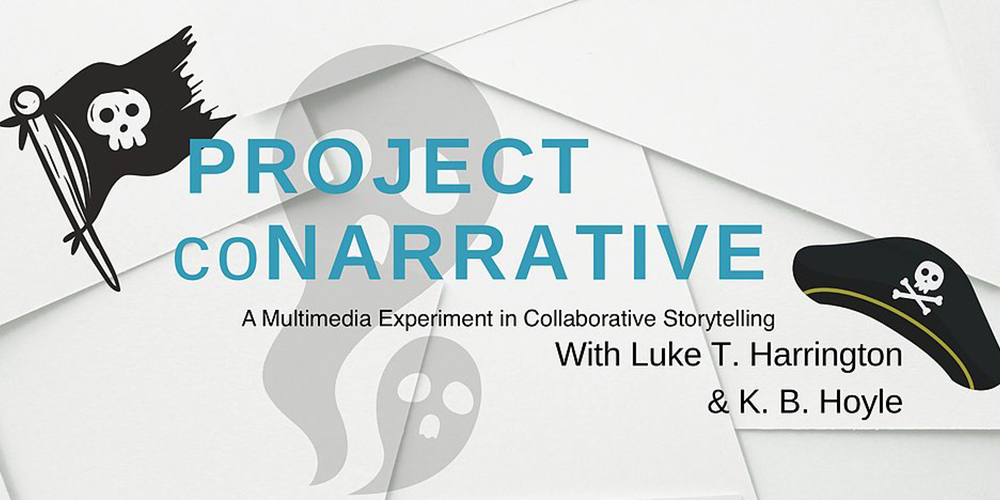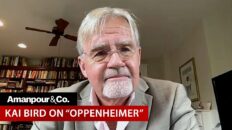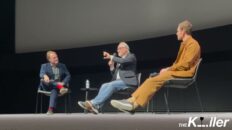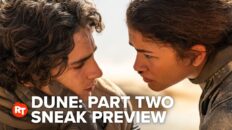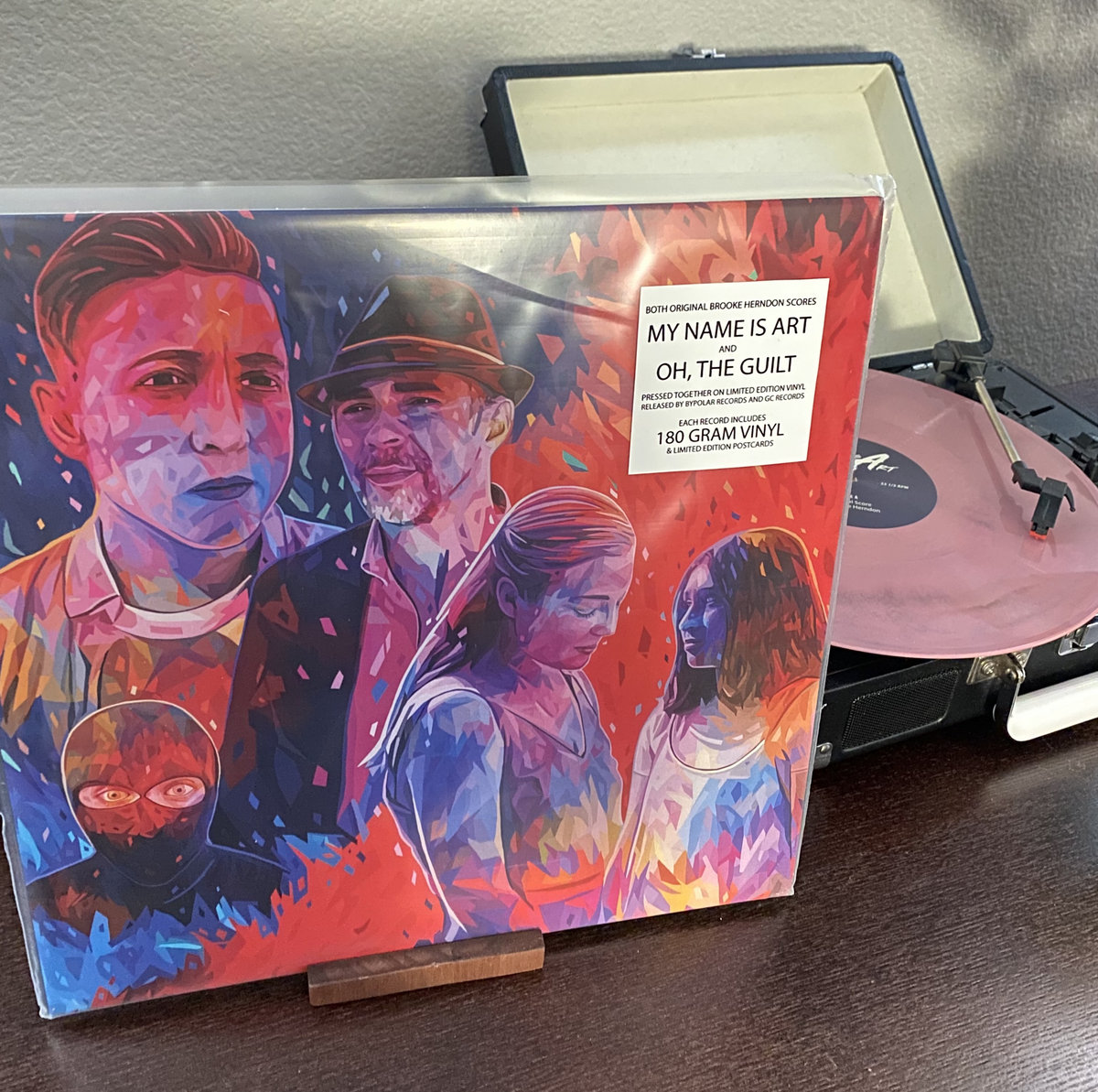RUD: Thank you both for taking some time to talk to us. Can you tell us a little about yourselves?
LUKE: I’m a writer based in Madison, Wisconsin. I’ve published one novel, Ophelia, Alive: A Ghost Story, which won a handful of awards, back in 2016. My next book will be my nonfiction debut, Murder-Bears, Moonshine, and Mayhem: Strange Stories from the Bible to Leave You Confused and Uncomfortable, which will be out from HarperCollins in August of 2020. I’ve also written for places like Christianity Today and BuzzFeed, and I host a podcast called Changed My Mind with Luke T. Harrington, where I interview people who have changed their minds about important things. In my spare time, you can find me doing stuff no man in his 30s probably should, like roller skating and wearing skinny jeans. I live with my wife and two young daughters.
K.B.: I’m a multiple award-winning YA author and pop culture writer living in Birmingham, AL with my husband and four sons. I have written twelve books, contributed to an anthology, and written articles for numerous publications. Most notably, my six-book MG/YA Fantasy Adventure series, The Gateway Chronicles and my YA/NA Dystopian series, The Breeder Cycle, are both available on Amazon. My column, “Storied,” can be found at Christ and Pop Culture, and I am represented by Ben Grange of the L. Perkins Agency. With whatever time I have remaining between all the writing and managing my family, I do odd jobs relating to my writing career, including teaching writing and publishing seminars. I currently teach two courses at Samford Academy of the Arts and one independent course. You can learn more about me and all my writing at kbhoyle.com!
RUD: How did the two of you connect? And what is Project CoNarrative?
LUKE: We originally met through mutual involvement with the website Christ and Pop Culture. We’ve both written for it, and we originally started interacting with each other in that site’s forums on Facebook. I knew K.B. was a fairly successful novelist, so when I went to publish my first novel, I begged her to write me a blurb. She surprised me by having a lot of nice things to say about it, and then she went above and beyond by pushing me towards some awards competitions she thought I should enter it in. In 2017, we each won a couple of Literary Classics Awards, and we finally met in person at the ceremony. We hit it off right away, and we’ve been good friends ever since.
The idea for Project CoNarrative originally came about back in August. We were lamenting the difficulty of promoting yourself as a fiction author on the interwebs, and I suggested that maybe we could do something together. We started kicking ideas back and forth, and before either of us really knew what had happened, we had a plan: we would write a whole novel, live on the internet, improv-style. I write a chapter, she writes a chapter, and we try our best not to murder each other. Then pirates and giraffes got involved somehow.
K.B.: Right! Luke covered the basics of how we met and became friends, so I don’t think I need to recap anything there. Meeting in person at the Literary Classics ceremony in Rapid City, SD was a ton of fun—and a little nerve-wracking, too. Meeting internet friends in real life is always tricky because there’s the question of whether they will be similar to their online persona or a totally different person. Luke was refreshingly, in person, all the best parts of his online persona, although I think I did tell him that he was funnier online. [laughs]
When Luke suggested we write a novel together on the internet, my knee-jerk response was to say no. We have extremely different styles of writing, we do not enjoy the same TV shows, movies, music, or, well, books. It kind of seemed like it would be a recipe for disaster and that it might seriously test our friendship. But then I got to thinking about it, and I realized that could be exactly what makes this thing a success. It could be extremely entertaining for people to follow an “odd couple” like us as we try to navigate a project like this—together, without killing each other or ending up never wanting to speak again.
So we began to work out the details: how we would actually execute the project and story, what would be free to the public, what we would ask people to support us to do on our Patreon, what sorts of ways we could add value to people’s lives and writing careers who are interested in following along to learn something about writing, what sorts of ways we could add value to people’s lives just by entertaining them, what aspects needed to be set up as an actual business, etc. So that’s how Project CoNarrative took shape to become the online novel and the Patreon (which includes a podcast, a quarterly newsletter, and other perks that are listed on the site).
RUD: You mention your different tastes in media and styles of writing, and your published works inhabit different genres. What genre is the Project CoNarrative based in? And how did you settle on it?
LUKE: K.B.’s body of work is YA and middle-grade sci-fi and fantasy, while my own oeuvre tends more toward adult-oriented humor and dark fiction, so we knew early on that we were going to have to lean into our differences and do something eclectic. The first thing we agreed on was that the book would have two narrators–one teen and and one adult–who would alternate chapters. She’s writing our teen character, wannabe sailor Sunflower Smith-Jones, and I’m writing the adult, Captain Doug.
When it came to the specific genre, we thought it would be interesting to choose it at random. You can listen to us do it “live” in the first episode of the podcast, but to make a long story short, when the dust had cleared, we had agreed on a blend of three genres: paranormal, coming-of-age, and pirate adventure.
K.B.: Right! A few of my stories do get a little dark, but I definitely stick to the fantasy and science fiction genres. I have a fairy tale retelling that is out on submission right now, and a science fantasy (think A Wrinkle in Time)—both works that are with my agent and haven’t yet been published. But even though you could argue that thematically my books deal with just as heavy material as Luke’s do, I keep things lighter on the surface for the sake of my intended audiences.
We did decide, as Luke mentioned, to pick our genre “live” on our first podcast. It makes for a great entertainment factor, and it’s something that — because of the improv nature of the storytelling experiment — just really didn’t need to be planned out ahead of time. What gave us our first little kerfuffle (and if Luke can use words like oeuvre, then I can use kerfuffle) was when I told him we should really also draw what our audience was going to be on our first podcast. Luke said something to the effect of, “Oh… we can just write and see where the story takes us. We don’t have to determine that, do we?” (which is a very “pantser” response). And I had a minor aneurysm. Because in my opinion, determining your audience is one of the most crucial decisions you make before you start writing. A story written without an audience in mind is a story written for no one.
So we went back and forth a little bit, and basically we compromised: We had already decided, as Luke mentioned, that he would be writing an adult character and I would be writing a teen character so we could both write to our strengths. Instead of choosing an audience during our first podcast, we would choose who would be writing the first chapter. That would, essentially, also direct the audience (and other things, like tone) of the entire book. Because I knew Luke would set the tone and audience to adult, and I would set it to YA. So Luke ended up selecting the first chapter, and that’s what he did, and I am following his lead. So, yeah, the Project CoNarrative novel is definitely shaping up as an adult paranormal coming-of-age pirate adventure.
RUD: Why are you writing a book “live” online? You’ve got a Patreon set up, you’re doing a podcast. This is all very performative — something that writing typically is not. What’s your motivation for this approach?
LUKE: I think K.B. and I are both performers at heart. I’m happier in front of a crowd than almost anywhere else–there’s hardly ever been a part of my life where I wasn’t acting, singing, speaking, dabbling in stand-up comedy, etc. (K.B. probably has a more impressive résumé than I do here, but I did audition for American Idol once. So… that’s a thing.) Really, I only settled on writing as a creative vocation when my daughter was born and I realized I would be a prisoner in my own home for the next four or five years.
Beyond that, though, there’s an essence of suspense to a live performance that a finished, polished work simply can’t replicate. You can write a suspenseful story, sure, but with a live performance–and particularly an improvisational performance–there’s a sort of meta-suspense of Will they pull this off? Will they stick the landing? Add to that the fact that, in the internet era, basically everything people do is performative, and something like Project CoNarrative, while exciting and new, seems kind of inevitable.
K.B.: Literally everything Luke said is accurate here. [laughs] This is probably the one area that he and I are the very same person (and maybe explains the depth of our friendship? Luke, we should maybe definitely chat about this on our podcast?). Although creative people are traditionally introverts, I love the stage, the microphone, the (let’s just admit it) attention that comes from performing. I went out for every play I could, every musical, I sang, played instruments, took improv lessons at Second City in Chicago, and told my parents I was going to go to Hollywood and be an actress. In recent years, I’ve picked up background acting and have appeared in a handful of shows and movies–I will never pass up the opportunity to mention that I have eight full seconds of screentime in Avengers: Endgame. [laughs] There is a serious high that comes from making art—performatively—for other people.
But, ultimately, I’m a writer at heart. So, yes, when Luke suggested doing this project live, that performative element was a big draw for me because it added in that element of risk you only get from live performing. It’s the edge of terror that you won’t succeed, that you will freeze or flop or be laughed or mocked “off stage,” but the fear and risk of failure also makes the rush of the performance that much more fulfilling. You don’t usually get the live-performance aspect in writing a book, I should add. Because writing is deliberate and slow and it takes planning, and most often those of us in the industry work on things that don’t see the light of day (don’t reach their audiences) for years after their creation. But reaching our audiences—getting that feedback and the push and pull of the audience response—is a huge part of why we create, so I feel like an injection of “live improv” into the novel writing experience through something like Project CoNarrative is not only fun, it’s valuable and… maybe a little soul-feeding to me and to Luke.
RUD: You’re a few chapters in now. What have you found to be the most surprising part of this project so far? The most challenging?
LUKE: Probably what’s been most surprising to me so far is how much K.B.’s and my strengths complement each other. She’s someone who really cares about the bones of a story, while I’m much more interested in the trappings–her plots tend to be rock-solid, while I’m more a fan of pretty prose and snappy dialogue. Before we started, I was worried that sort of thing would lead to conflict, but so far it’s been the opposite; she keeps the story moving, and I write the scenes where characters react to the absurd situations they find themselves in–and, of course, a good story needs both. The challenge there might be avoiding falling into a rut, but so far the writing has been the easiest part of this project.
What’s been harder is the day-to-day operations of the enterprise–but again, our strengths seem to be complementing each other pretty well there, too. K.B. runs the Patreon, the social media accounts, and the newsletter; I built the website, edit the podcast, and deal with business paperwork. I don’t think web design is my strong suit, but I’ve gotten a lot of compliments about the Project CoNarrative website, so I guess I’m doing something right. Meanwhile, K.B. keeps the sweet memes coming on our Twitter account.
K.B.: Yeah, I mean, again I can only agree with Luke here. Our skills—both on the business end of things and the writing end—complement each other, and it hasn’t really led to any challenges, quite the contrary. I was most worried about the writing aspect when it came to our different styles, but I think we’re really coming together well in that regard. I know I was really happy with some of the plot elements Luke added, for example, in chapter three that built on some of the “bones” of the story that are really important to me, and I’ve been working hard to “lean in” to his style of dialogue to help the overall… story aesthetic, I guess you could say, have a unified feel. Writing this thing has natural challenges just from the improv style of it, but writing it with Luke doesn’t feel as much like tug-of-war as I worried it would; it feels more like, “Oh, okay. He’s super good at this, and I’m super good at this, so let’s just put these two things together.”
Luke already broke down our tasks for the operations of things, so I’ll just add that as far as my personal challenges there are concerned, I’m just busy right now. I have a few book releases (two new books in my Breeder Cycle trilogy and an audiobook) that have to be executed by the end of the year, so that’s pulling me away more than I would like from things like social media promotion for this project. I’m also on sub for another manuscript with my agent, working on yet another book, writing my column for Christ and Pop Culture every other week, and teaching three writing courses every week. So… life right now is a challenge, and will continue at breakneck speed through December, at least. But I’m the sort of person who would rather be busy than bored, so I do welcome the work.
RUD: You’ve talked a little about the plot and characters. My understanding is that the story is based off of some real-life experiences Luke had. Can you talk about that, Luke?
LUKE: Sure. My junior year of college, I was involved with a group called the Sea Education Association based in Woods Hole, Massachusetts. The main thing they do is a semester-long program for college students called the Woods Hole S.E.A. Semester, where you study oceanography, nautical science, and maritime studies. Half the semester is on land, and then for the second half, you actually go to sea on a schooner, with the students acting as the crew of the ship. Every time I mention it to someone, they’re like, “You should write about that!” And, I’ve tried, but… I’ve never really been sure what to say about it. It’s been more than a decade, but there still doesn’t feel like enough emotional distance to write about it honestly.
When K.B. and I pulled the “pirate adventure” genre out of a hat, though, that seemed like a good opportunity to dredge up some of those memories of studying on Cape Cod and sailing the Caribbean. So I wrote the first chapter about the first really boneheaded move I made during my tenure at S.E.A.: I tried to walk all the way from the Woods Hole bus stop to S.E.A. headquarters, carrying all of my luggage for the entire semester, in a winter coat, on an unseasonably warm February day. Eventually I gave up and hailed a cab, but not before I spent the better part of an hour feeling like an idiot.
In the chapter, I changed the name of the organization to O.C.E.A.N. (“the Oceanographic Corporation for the Education of Affluenza’d Neophytes”) and I replaced the “me” character with a teen girl named Sunny. And, of course, the real twist is that the “cab” she hails is actually an Uber coincidentally being driven by her ship’s captain, Doug. Writing for the two characters is easy, because they’re essentially both me: Sunny is me before I went to sea and had this wide-eyed, romanticized idea of what it would be like, while Doug is the grizzled me who’s had that experience (in his case, many times) and knows that, ultimately, working on a ship is just like any other job: there are good days and bad days, occasional transcendent moments mixed with days and days of nausea, exhaustion, and drudgery.
My original thought was that we could start with the more “realistic” stuff on shore in Massachusetts and gradually work our way up to the weird stuff with ghosts and pirates, but of course K.B. threw a wrench into the whole thing by not knowing anything about New England, so she just kind of panicked and jumped feet-first into the paranormal stuff. By the end of chapter two, Sunny was already a ghost, which is definitely hilarious and awesome, but also means that I can’t promise the rest of this book will hew at all closely to my experience at S.E.A.
K.B.: I’m just going to nudge in here and say that I did not panic. [laughs] I intended from the moment we pulled “paranormal coming of age pirate adventure” out of a hat on our first podcast to kill off my main character in the first chapter I wrote about her (or him, depending on what Luke gave me to work with). Having zero knowledge of any of this S. E. A. stuff, and writing this book the way we are (and also being as busy as I am), I wasn’t about to sit down and do a bunch of research, though. Also, we are writing a paranormal pirate adventure, so there are story pacing issues to consider—and also pacing issues because we are bound to the time and chapter constrictions of wrapping this project by October of 2020. I honestly didn’t know what Luke had in mind re: training on land for a portion of it and stuff like that, but what I do know about story is you don’t wait for chapters on end to have an inciting incident, and when you promise your audience a paranormal (coming of age) pirate adventure, then you’d better amp things up right away in chapter two, and it had better be clear that’s where the story is heading. Keeping the characters land-bound doesn’t achieve that (and who wants to read about a bunch of teens training to go to sea? That’s not interesting. Just dump them out on a ship and let the hijinks ensue!). So, that’s where my writing brain went with the story—knowing nothing at all about Cape Cod, S. E. A., or Luke’s actual experiences.
LUKE: Rowr.
RUD: How will you measure the success of this project? Reader numbers? Reader feedback? Just finishing?
LUKE: It’d be awesome to see the finished book achieve some sort of critical or commercial success, and it’d be great to get enough Patreons to make the thing sustainable. Really, for me, though, it’s enough to be working together with a good friend whom I really admire. So far it’s been collaborative bliss, and with any luck it’ll only get better. Really, the main test of success for me is if this time next year we’re gearing up for Project CoNarrative: Season Two.
K.B.: Um… yeah! I’m trying to think if I really have anything to add here. It’s been so much fun so far, even when the workload has been a little stressful. We’d really love to see our Patreon base expand, but really I just have to ditto everything Luke said. I think we already have more readers than we are aware of, based off social media likes and follows and general responses, so that’s already encouraging. There’s no doubt we’ll finish the thing (I mean, unless some grand tragedy befalls one of us), so really we just need to gain traction, convert readers into patrons, and figure out more ways to add value to our patrons’ experiences. And whatever else comes of this, we get to work with each other, and we’re good friends, and it’s always good to do good work with a friend.


